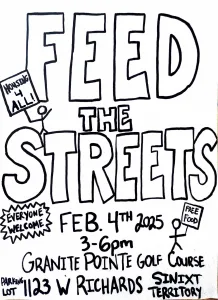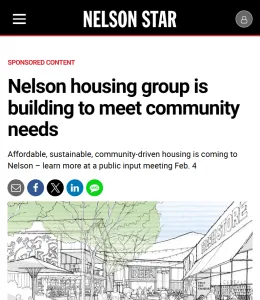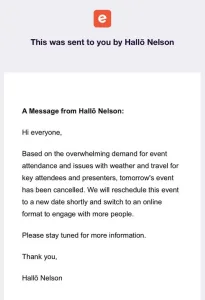Hallо̄ Properties’ attempt at a "public input meeting" was anything but public. Instead, it became yet another PR disaster—one that ended in humiliation, deception, and a full-scale cancellation.
Here’s what really happened.
Announced on a Friday, "Sold Out" by Saturday
On Friday, January 31st, 2025, Hallо̄ Properties quietly announced an Open House for Tuesday, February 4th.
It was billed as a chance for locals to learn more about the project and share their thoughts. However, within less than 24 hours, all 50 available seats were gone.
For context: Nelson is a town of 11,000 people, and this development is one of the most controversial issues in decades—yet Hallо̄ chose a venue that could only accommodate 50 people.
Locals immediately began questioning the legitimacy of the event:
- Why was there so little notice?
- Why was the venue so small?
- Why was pre-registration required, with personal details collected?
- Why did questions have to be pre-submitted?
It was clear that this wasn’t a real public forum—it was a controlled PR stunt.
Locals Push Back & a Protest Forms
Angry residents, shut out of the event, began organizing.
- Some locals planned to protest by showing up without tickets to mingle in the parking lot.
- Feed the Streets, a local advocacy group, announced they would shuttle unhoused residents to the event and serve them chilli and brownies in the parking lot.
Hallо̄ and the Golf Society panicked.
The Cancellation & The Cover-Up
On February 3rd, Hallо̄ announced that the Open House was canceled.
The official reason? Bad weather and a long waitlist.
But privately, Hallо̄’s CEO Farhad Ebrahimi admitted this was a lie.
What Farhad Really Said
In a private conversation, Farhad confessed that the real reason for the cancellation was pressure from the Golf Society, who were terrified at the idea of unhoused people attending.
"Corbyn calls me... And he's like, Farhad, you will not be able to have your event here tomorrow. We're shutting the gates. Nobody's coming. And I'm like, what's going on? They're loading up homeless and drug-addicted. They're going to be loading them up with drugs, and they're sending them all to come to the event. Go have your event downtown or somewhere else."
Hallō claimed the cancellation was due to weather and logistics—but the sequence of events suggests it might have been about keeping certain people out.
The Lies, The Elitism, and the Damage Control
Hallо̄ Properties attempted to control the public narrative, but it backfired spectacularly.
- The Open House was never meant to be truly open.
- When public pressure escalated, they panicked.
- Instead of admitting the truth, they fabricated a cover story.
Farhad even went so far as to ask for this website to be taken down—a desperate attempt to stop the truth from spreading.
But the truth is out.
Compassion for Unhoused People
Housing insecurity is deeply important to most Nelsonites—but Hallō and its partners have shown where their priorities lie.
Their decision to cancel the open house out of fear that unhoused people might attend speaks volumes. Instead of engaging with the realities of Nelson’s housing crisis, they chose to exclude and mislead the public about why the event was scrapped.
But beyond the dishonesty, what does it say about Hallō and the Golf Society that they see the most vulnerable members of our community as a threat rather than people in need of support?
Many of those living on the streets in the dead of Canadian winter are there because of circumstances beyond their control—a medical condition, a job loss, or a workplace injury. Their struggle should inspire compassion, not fear.
What This Means for Nelson
This is not the kind of developer Nelson needs.

